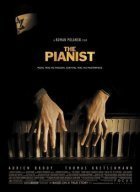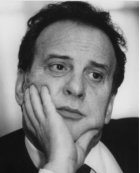
The Pianist Page #27
INT. 4TH FLOOR LANDING - DAY
The attic door being kicked in by a German boot.
A German soldier, wearing his gas mask, bayonet fixed,
enters the attic, looks round, sees nothing, then:
GERMAN VOICE:
At the double, Fischke!
The soldier turns and hurries out.
INT. ROOF, BACK OF BUILDING - DAY
On the sloping roof, Szpilman clutches the skylight and
has his feet in the roof gutter.
He listens - all quiet in the house.
And then a bullet ricochets off the tiles beside him.
Szpilman, terrified, drops, involuntarily catching a lower
edge so that his feet dangle above a balcony below. More
shots. He drops on to the balcony and looks back.
EXT. ROOFTOP, TWO STREETS AWAY - DAY
Two German soldiers are firing at Szpilman.
INT. ROOF, BACK OF BUILDING - DAY
Szpilman clambers back into the building through the smashed
balcony door. A couple of shots dangerously close.
INT. STAIRCASE - DAY
Smoke. Szpilman staggers down the stairs, stumbles over a
corpse and almost falls headlong.
EXT. GARDEN AND BACKYARD - LATE AFTERNOON
The sun is setting.
Szpilman crawls into the backyard. He hears German voices
shouting commands. He hides behind three garbage bins by
the wall.
He waits. Listens. Silence
EXT. STREET - EVENING
Deserted. Buildings on fire but dying out. Corpses in the
street, including the woman who was shot, still in her
strange kneeling position.
EXT. FRONT DOOR AND STREET - NIGHT
Szpilman watches from the doorway. Then, dropping down, he
crawls across the road on his stomach, threading his way
through the dead bodies, now besieged by flies, and makes
for the hospital opposite.
German soldiers appear from around a corner. Szpilman
immediately lies still, pretending to be just another
corpse. Flies alight on him. When the Germans pass, he
sets off again.
INT. RUINED HOSPITAL, OPERATING THEATRE - NIGHT
Dark. Szpilman crawls into a corner, rests. He's exhausted.
He tries to take stock of his surroundings. He can make
out the operating table. He manages to drag himself on to
it.
He lies there, his eyes grow heavy. He sleeps.
EXT. RUINED HOSPITAL - DAY
German soldiers dragging the corpses into a pile.
A sergeant douses the bodies in petrol, then sets them
alight.
The bodies burn.
INT./EXT. RUINED HOSPITAL - SZPILMAN'S POV - DAY
From a shattered window on the first floor, he looks at
the burning bodies.
Two German soldiers wander into his eyeline. He draws back
a little but watches them warily.
They sit just beneath him, chatting, and take out their
food-tins, drink coffee and eat bread.
INT. PASSAGE AND WARDS, RUINED HOSPITAL - DAY
Szpilman wanders down the passage, sees into the wards,
the empty beds, the broken furniture and medical equipment.
INT. KITCHEN, RUINED HOSPITAL - DAY
Szpilman opens cupboards, drawers, searching, but trying
to be as quiet as possible.
He sees the refrigerator, quickly gets to it, pulls open
the door. Empty.
He looks around and notices a red fire bucket with a spade
and a box of sand next to it. The bucket is full of water,
covered with an iridescent film and full of dead flies.
He drinks as much water as he can without swallowing the
flies and, while he's doing so, he spots a couple of sacks.
He opens the first: potatoes. The second contains barley.
He tries to eat the uncooked barley but can't.
Later:
A fire on the floor. Szpilman holds a saucepan over it and
is cooking the barley and some potatoes. He manages to
scoop out a spoonful, blows to cool it, then eats.
INT./EXT. RUINED HOSPITAL - SZPILMAN'S POV - DAY
Szpilman at a window sees autumn leaves thick on the ground.
And at the end of the street, a line of Poles, some with
their hands in the air, others with hands on heads, being
marched away by German soldiers.
INT. WARD. RUINED HOSPITAL - DAY.
Szpilman lies in bed under several layers of blankets. Ice
on the windows. He hears German voices shouting commands.
He sits up.
INT./EXT. RUINED HOSPITAL, SZPILMAN'S POV - DAY
Szpilman gets to a window and looks out.
German soldiers with flame-throwers are burning the
buildings opposite.
One soldier, with a bucket of white paint and a brush,
numbers the building.
Szpilman cranes to see them reach the end of the street,
then cross over and start on the buildings on his side,
working their way towards the hospital.
He pulls away and makes for the back of the hospital.
INT. BACK OF RUINED HOSPITAL - DAY
Szpilman goes to a window, jumps out. He twists his ankle.
He's in pain. He crawls across the back garden and climbs
over the wall.
EXT. RUINED STREETS - DAY
Devastation, not a human being in sight.
Nothing. Emptiness.
He is alone.
Szpilman hobbles away.
Cautiously, Szpilman limps towards the villa, a once grand
building, but now partly damaged by shell fire.
He makes his way in.
INT. HALL, RUINED VILLA - EVENING
Szpilman enters the hall, still showing signs of its former
opulence. I Silent. Ominous.
Translation
Translate and read this script in other languages:
Select another language:
- - Select -
- 简体中文 (Chinese - Simplified)
- 繁體中文 (Chinese - Traditional)
- Español (Spanish)
- Esperanto (Esperanto)
- 日本語 (Japanese)
- Português (Portuguese)
- Deutsch (German)
- العربية (Arabic)
- Français (French)
- Русский (Russian)
- ಕನ್ನಡ (Kannada)
- 한국어 (Korean)
- עברית (Hebrew)
- Gaeilge (Irish)
- Українська (Ukrainian)
- اردو (Urdu)
- Magyar (Hungarian)
- मानक हिन्दी (Hindi)
- Indonesia (Indonesian)
- Italiano (Italian)
- தமிழ் (Tamil)
- Türkçe (Turkish)
- తెలుగు (Telugu)
- ภาษาไทย (Thai)
- Tiếng Việt (Vietnamese)
- Čeština (Czech)
- Polski (Polish)
- Bahasa Indonesia (Indonesian)
- Românește (Romanian)
- Nederlands (Dutch)
- Ελληνικά (Greek)
- Latinum (Latin)
- Svenska (Swedish)
- Dansk (Danish)
- Suomi (Finnish)
- فارسی (Persian)
- ייִדיש (Yiddish)
- հայերեն (Armenian)
- Norsk (Norwegian)
- English (English)
Citation
Use the citation below to add this screenplay to your bibliography:
Style:MLAChicagoAPA
"The Pianist" Scripts.com. STANDS4 LLC, 2025. Web. 16 Jan. 2025. <https://www.scripts.com/script/the_pianist_72>.



Discuss this script with the community:
Report Comment
We're doing our best to make sure our content is useful, accurate and safe.
If by any chance you spot an inappropriate comment while navigating through our website please use this form to let us know, and we'll take care of it shortly.
Attachment
You need to be logged in to favorite.
Log In